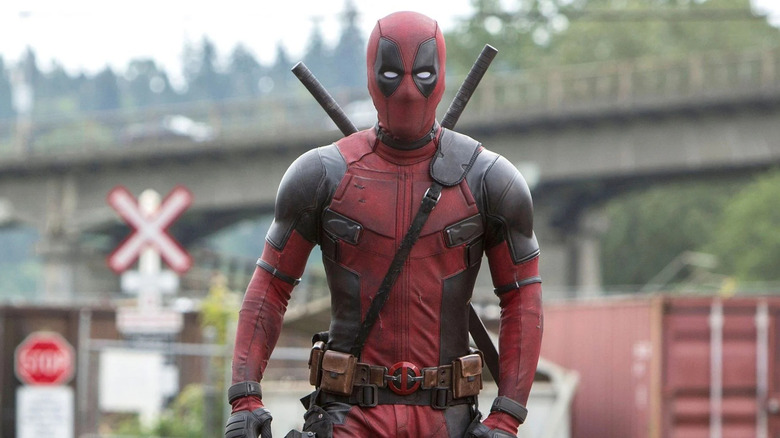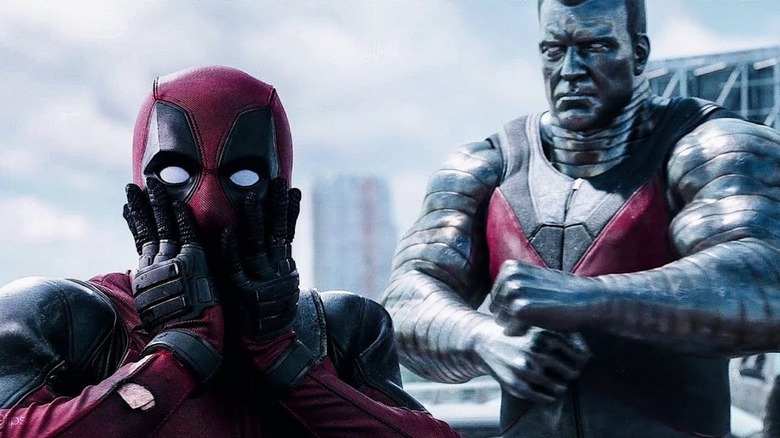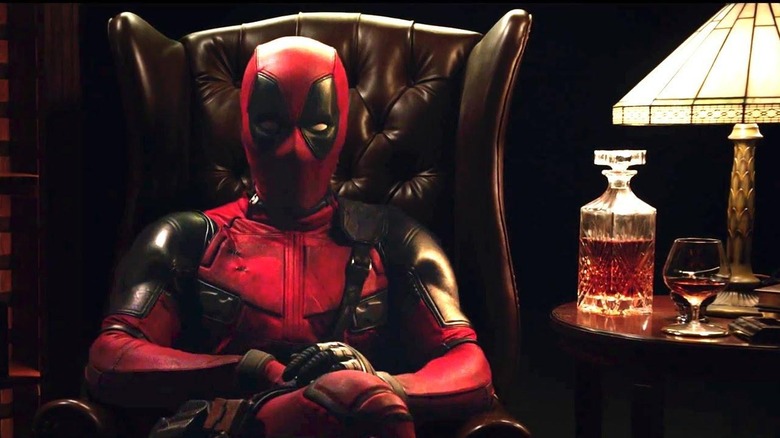Ryan Reynolds' Work On Deadpool Went On Long After Filming Wrapped
After years of trying to decide what it wanted to do with Ryan Reynolds — he made attempts at action star, superhero, romantic lead, and intense horror actor — Hollywood finally struck gold in 2016 with the release of director Tim Miller's "Deadpool." It was a film set in the universe of "X-Men," but also a send-up of it. Deadpool — a staple in Marvel comics since the early '90s — was a flip, foulmouthed antihero who had become aware that he was a character in a comic book. His superpowers ensured that he could never die, leaving the character free to do or say whatever crossed his mind without consequence. Deadpool's devil-may-care, violent, deconstructionist attitude was a perfect fit for Reynolds, whose mercenary comedy skills had been firmly established in his earlier leading roles like "Van Wilder."
"Deadpool" was written by Paul Wernick and Rhett Reese, and Reynolds, one of the film's producers, was closely involved with the writing process, ensuring that the screenwriters kept the character in a certain spirit. Keeping in said spirit was a process that — according to a 2016 interview with Reynolds and the screenwriters with The Playlist – continued long after filming was completed. Thanks to the design of the character, adding dialogue to the movie was a snap. Deadpool's face was completely covered, and Reynold's actual eyes were replaced by pure white CGI facsimiles to match the look of the character on the comic book page. Reynolds, while certainly expressive, was still in a position where large swaths of his dialogue could be swapped out in post-production.
And that's exactly what the filmmakers did.
ADR galore
Additional dialogue replacement (ADR) is a regular part of the filmmaking process, as on-site audio can sometimes be rendered unusable for a variety of reasons, or an actor needs to give another pass at a certain line. Sometimes a line may need to be altered for plot clarity. There are any number of reasons that an actor will have to return to a recording booth to add dialogue back into a movie. With "Deadpool," ADR became a valuable tool for doctoring up the film's raunchy sense of humor. Reynolds, sometimes thinking of better jokes after the fact, was able to come in and add them to his character in post, not needing to be concerned about his mouth not matching. As Wernick explained to The Playlist:
"Rhett and I say we worked harder from the day the movie wrapped until the day the movie locked than we did all the five or six years leading up to that because again, he is in a mask. It's a little bit like an animated movie. You can put words into his mouth at any point in the process."
Reynolds adds that some guerilla recoding techniques were also employed, explaining that "[t]here are paragraphs that you saw up there that were recorded on my iPhone. I'm not kidding." These impromptu iPhone recordings may be the reason why some of the dialogue from the film's trailer didn't necessarily match the finished version. There was a lot of tinkering in post that was not necessary for the plot of the movie, but simply made it funnier. With a character like Deadpool, a little bit of extra chaos would certainly be welcome.
The marketing
The additional work also didn't stop with the film itself. Reynolds, working with a limited marketing budget, helped come up with an extensive and unique ad campaign that expanded the self-aware mythos of "Deadpool" into the real world. Amusing, cross-genre billboards made the film look like a romantic comedy ("Deadpool" was released two days after Valentine's Day). TV spots featured Deadpool, in-character, addressing the audience directly, talking about the movie ... or other things ... like Australia Day. A running gag in the film is that Deadpool carried resentment toward Wolverine (as well as Australian actor Hugh Jackman) due to Reynolds also appearing — as a fan-hated version of Deadpool — in the 2009 film "X-Men Origins: Wolverine." The layers of reality are laid on pretty thick.
Reynolds/Deadpool also added an extra layer of meta-commentary on top of the popular internet series "Honest Trailers," appearing to comment on his own trailer commentary. The meta joke was taken one step further upon the release of "Deadpool 2," wherein Deadpool did an Honest Trailer ... for "Honest Trailers." It makes more sense if you follow it closely.
Reynolds created so much original content for the marketing of "Deadpool" that it eventually became an outcropping of the actual film. Say Reynolds:
"That was the thing that I think was particularly unusual about 'Deadpool' is that the marketing campaign was a direct extension of the film itself ... I was in it I think more during the marketing than I was in the film."
Since the release of "Deadpool 2," Disney has assumed control of the character, arousing concerns that any potential "Deadpool 3" would be "softened" by Disney's family-friendly imprimatur. Reynolds has assured us Deadpool will remain crass and R-rated. We can only keep our severed fingers crossed.


